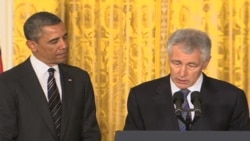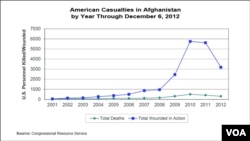PENTAGON —
If he’s confirmed, Chuck Hagel - President Barack Obama’s pick to be the new defense secretary - will immediately have to deal with cutting the U.S. defense budget by $487 billion or more and the drawdown of troops from Afghanistan.
The decisions will be tough, but for the 66-year-old Republican former senator from the U.S. state of Nebraska, they will be a natural fit.
Hagel has spoken out against shedding the blood of U.S. soldiers in conflicts with unclear goals. He supported the U.S. invasion of Iraq by voting to authorize the use of military force at the start of the war, but later opposed sending more U.S. troops in what was known as the surge.
He also has spoken in favor of cutting waste at the Pentagon, telling The Financial Times in 2011 the Defense Department was “bloated” and needed to be “pared down” after the wars in Iraq and Afghanistan.
As one who fought on the front lines in Vietnam, Hagel would bring an added dose of reality to the job of defense chief. He enlisted as an infantryman and was wounded twice. To this day, bits of shrapnel are still lodged in his chest and he has burns on his face and arms. Awarded two Purple Heart medals for his valor, he brings added respect from the troops he will command if confirmed. It will be the first time a former enlisted soldier becomes secretary of defense.
Some say his first-hand experience of the horrors of war has fostered in him a more cautious attitude on engaging in armed conflict.
In announcing Hagel’s nomination at a White House press conference Monday, Obama said the former Nebraska senator is a patriot who understands that sending young Americans to fight and bleed is “something we do only when absolutely necessary.”
Standing next to Obama after the announcement of his nomination, Hagel said he is grateful for the chance to work to strengthen the United States and its allies, but also to advance global freedom, decency, and help build “a better world for all mankind.”
Hagel has pledged to offer honest counsel to the president at a time when the United States is withdrawing its troops from Afghanistan ahead of a deadline at the end of next year.
Breaking with the party
Hagel, a Republican, is known in Washington for his blunt talk and independent positions. They have included splitting with his party in opposing the Iraq war and his criticism of Washington’s handling of the war in Afghanistan, where half of the territory remains under the control of insurgents more than a decade after American troops landed in the country.
With much of the Afghanistan exit strategy still undecided, there is much room for him to influence the president on the withdrawal of troops.
“It certainly is of relevance that Senator Hagel has been relatively skeptical of the Afghanistan mission and you would have to assume that he’d be a voice joining that of Vice President [Joe] Biden arguing in favor of perhaps a little faster drawdown,” said Michael O’Hanlon, a defense analyst with the Brookings Institution, a research organization in Washington.
Few expect Hagel to keep his frustrations about Afghanistan quiet if he is confirmed as defense secretary. Frederick Kempe, president of the Atlantic Council, worked closely with Hagel while the former senator served as chairman at the Washington research group. He said Hagel will not waste time before assessing what the U.S. should be doing at this stage in Afghanistan.
“The one thing you know will happen is he will ask the tough questions,” said Kempe.
“He’ll say, ‘what are we negotiating with the Afghans, for what purpose? What is the regional context? How much do we need to leave behind and for what purpose in the regional context?’”
The Senate battle ahead
Hagel faces a battle for confirmation at the U.S. Senate by those who accuse him of being less supportive of Israel and not so tough on Iran.
In past remarks, Hagel has spoken of what he described as an intimidating “Jewish” lobby and been against unilateral sanctions against Iran over its nuclear ambitions - raising questions of whether he would be less supportive of an Israeli preemptive strike on Iran.
The confirmation of White House counterterrorism advisor John Brennan as the new CIA chief is expected to be less contentious, although he was the architect of the U.S. drone program to kill suspected terrorists.
Analyst Michael O’Hanlon said Brennan likely will be judged more on his efforts to eliminate al-Qaida leaders before they attack U.S. interests again. “I don’t expect any trouble with his confirmation on those grounds.”
The decisions will be tough, but for the 66-year-old Republican former senator from the U.S. state of Nebraska, they will be a natural fit.
US Defense - Hagel Bio Box
Chuck Hagel- Was chairman of the Atlantic Council public policy group
- Co-chairman of the President's Intelligence Advisory Board
- Republican U.S. senator from 1997-2009 representing Nebraska
- Served in Vietnam in 1968, where he earned two Purple Hearts
- Born in 1946 in Nebraska
He also has spoken in favor of cutting waste at the Pentagon, telling The Financial Times in 2011 the Defense Department was “bloated” and needed to be “pared down” after the wars in Iraq and Afghanistan.
As one who fought on the front lines in Vietnam, Hagel would bring an added dose of reality to the job of defense chief. He enlisted as an infantryman and was wounded twice. To this day, bits of shrapnel are still lodged in his chest and he has burns on his face and arms. Awarded two Purple Heart medals for his valor, he brings added respect from the troops he will command if confirmed. It will be the first time a former enlisted soldier becomes secretary of defense.
Some say his first-hand experience of the horrors of war has fostered in him a more cautious attitude on engaging in armed conflict.
In announcing Hagel’s nomination at a White House press conference Monday, Obama said the former Nebraska senator is a patriot who understands that sending young Americans to fight and bleed is “something we do only when absolutely necessary.”
Standing next to Obama after the announcement of his nomination, Hagel said he is grateful for the chance to work to strengthen the United States and its allies, but also to advance global freedom, decency, and help build “a better world for all mankind.”
Hagel has pledged to offer honest counsel to the president at a time when the United States is withdrawing its troops from Afghanistan ahead of a deadline at the end of next year.
Breaking with the party
Hagel, a Republican, is known in Washington for his blunt talk and independent positions. They have included splitting with his party in opposing the Iraq war and his criticism of Washington’s handling of the war in Afghanistan, where half of the territory remains under the control of insurgents more than a decade after American troops landed in the country.
With much of the Afghanistan exit strategy still undecided, there is much room for him to influence the president on the withdrawal of troops.
“It certainly is of relevance that Senator Hagel has been relatively skeptical of the Afghanistan mission and you would have to assume that he’d be a voice joining that of Vice President [Joe] Biden arguing in favor of perhaps a little faster drawdown,” said Michael O’Hanlon, a defense analyst with the Brookings Institution, a research organization in Washington.
Few expect Hagel to keep his frustrations about Afghanistan quiet if he is confirmed as defense secretary. Frederick Kempe, president of the Atlantic Council, worked closely with Hagel while the former senator served as chairman at the Washington research group. He said Hagel will not waste time before assessing what the U.S. should be doing at this stage in Afghanistan.
“The one thing you know will happen is he will ask the tough questions,” said Kempe.
“He’ll say, ‘what are we negotiating with the Afghans, for what purpose? What is the regional context? How much do we need to leave behind and for what purpose in the regional context?’”
The Senate battle ahead
Hagel faces a battle for confirmation at the U.S. Senate by those who accuse him of being less supportive of Israel and not so tough on Iran.
In past remarks, Hagel has spoken of what he described as an intimidating “Jewish” lobby and been against unilateral sanctions against Iran over its nuclear ambitions - raising questions of whether he would be less supportive of an Israeli preemptive strike on Iran.
The confirmation of White House counterterrorism advisor John Brennan as the new CIA chief is expected to be less contentious, although he was the architect of the U.S. drone program to kill suspected terrorists.
Analyst Michael O’Hanlon said Brennan likely will be judged more on his efforts to eliminate al-Qaida leaders before they attack U.S. interests again. “I don’t expect any trouble with his confirmation on those grounds.”






